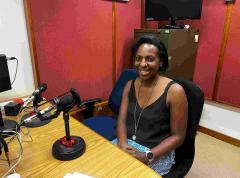簡介
主持人:Shirley Yeung
Listen to #Hashtag Hong Kong every Sunday morning at 8.15
Focussing on issues affecting civil society, we'll hear from representatives of NGOs, associations, statutory bodies, and non-profit groups.
(Sundays 8.15am - 8.25am)
最新

Daniel Lai - Programme Director of the Hong Kong Jockey Club Financial Education Programme
The Hong Kong Jockey Club Financial Education Programme is an initiative designed to empower upper primary students with essential financial competency they need for financial well-being and lifelong success.
Financial capability is more than just a skill—it’s a life necessity. It determines whether young people can navigate adulthood with confidence, achieve financial stability, and avoid pitfalls like scams or poor financial decisions. While Hong Kong ranks highly on global financial literacy indices, younger individuals often exhibit lower scores and express dissatisfaction with their financial situations.
Regardless of socio-economic background, all young people face financial decisions that can shape their long - term well-being. Unfortunately, most existing initiatives and after-school activities often fall short of providing a comprehensive, scalable solution. This gap underscores the urgent need for a structured, impactful programme like the one we’re discussing today.
Aligned with curriculum reforms in primary school Humanities subjects and supported by the Education Bureau, this programme is a collaborative effort initiated and funded by The Hong Kong Jockey Club Charities Trust . Partners include The University of Chicago Financial Education Initiative , The Education University of Hong Kong , the Hong Kong Family Welfare Society , CoCoon Foundation , and Solomon Learning Group .
At its core, the programme seeks to strengthen financial literacy as a future-ready skill. By equipping students with essential knowledge, the right mindset, and critical decision-making abilities, it aims to help them achieve long-term financial well-being and personal fulfillment. Students will learn to judge right from wrong in financial matters, avoid scams, and make informed choices, these are skills indispensable in today’s fast-paced digital economy.
What distinguishes this initiative is its holistic and sustainable design. By collaborating with local educators and global experts, the programme delivers high-quality learning materials and professional development support. Its integration into the formal curriculum ensures longevity, while its focus on experiential learning and community engagement makes it uniquely impactful.
The programme adopts a holistic approach, engaging three key stakeholders: students, teachers, and parents.
Central to the programme is a culturally relevant, age-appropriate curriculum tailored for upper primary students. Developed in alignment with the Hong Kong Financial Competency Framework and researches from the University of Chicago’s Financial Education Initiative, the curriculum integrates financial education into formal lessons, particularly in Humanities subjects. This ensures sustainability and creates a lasting impact within the school system.
To reinforce classroom learning, experiential activities such as marketplaces and inter-school competitions allow students to apply decision-making skills in real-life scenarios. These activities foster critical thinking, practical decision-making and problem-solving skills, helping students build confidence in assessing risks, and making sound judgments.
Teachers are pivotal to the programme’s success. To support them, professional development training and certification are provided, equipping educators with the tools and expertise needed to teach financial education effectively. Additionally, Communities of Practice will be established, bringing together teachers from different schools to co-create resources, share experiences, and foster collaboration. This network ensures that best practices are shared and scaled across participating schools.
Parents play an equally vital role in shaping their children’s financial habits. The programme offers parent-child workshops and public talks, providing expert advice and practical strategies for modeling sound financial behavior. Parents will also learn how to guide their children in recognising and avoiding financial scams which is a growing concern in today’s digital age. By involving parents, the programme creates a supportive ecosystem that reinforces financial education both at home and in school.
To ensure effectiveness, the programme incorporates an evidence-based evaluation design. This approach assesses student learning outcomes and provides valuable insights for continuous improvement. Data-driven feedback loops enable the programme to adapt and evolve, ensuring maximum impact.
Over the course of its implementation, the programme will benefit:
17,800 students , 240 teachers , and 1,500 parents across 70 schools.By targeting these groups, the programme creates a ripple effect, fostering a culture of financial literacy in school system.
The Hong Kong Jockey Club Financial Education Programme represents a critical step toward preparing young people for the future. By equipping them with the skills, knowledge, and mindset to make sound financial decisions, we are nurturing a generation of confident, financially responsible citizens.
Financial education is not just about numbers, it’s about empowerment, resilience, and opportunity. Together, we can create a brighter future for our children and our communities.
06/04/2025 - Daniel Lai - Programme Director of the Hong Kong Jockey Club Financial Education Programme























